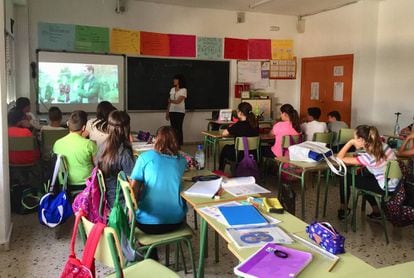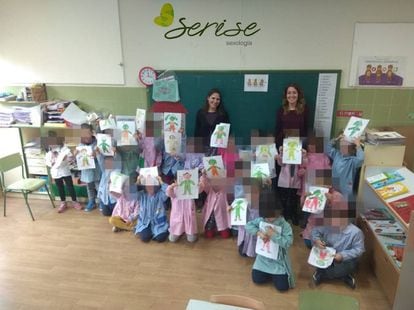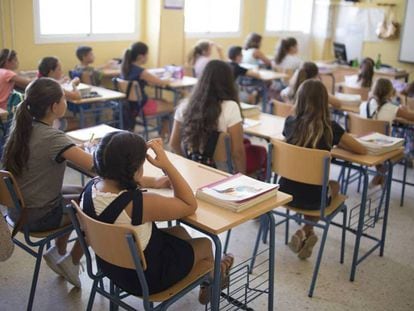Which school talks are under threat from the far-right’s ‘parental veto’ in Spain?
Vox is pushing for a system to be introduced in regional education programs targeting workshops on the prevention of homophobia, sexual abuse and teenage pregnancy

It all began with a photo. In April 2018, the then-chief of the education department of Spain’s southeastern Murcia region, Adela Martínez Cachá, of the conservative Popular Party (PP), posed for a press photo at a school with members of No Te Prives (Don’t Deprive Yourself), an LGBTQ+ collective that gives talks on preventing abuse and homophobia in schools.
“The [ultra-conservative Catholic organization] Family Forum demanded that parents be asked to give their permission to allow their children to attend our talks,” says Eva Illán, a social educator from the collective. Both Illán and members of the Murcia Association of High School Principals (ADES) say this moment was the origin of the so-called “parental veto,” a policy by the Spanish far-right group Vox that gives parents the right to stop their children from attending complementary workshops organized during school hours.
Schools are organizing fewer activities because of the bureaucratic and organizational problems involved with the parental veto
Clara García, workshop organizer
Under the policy, parents must give “express authorization” for their children to attend workshops on issues such as LGBTQ+ rights, school bullying and xenophobia. There has been no great outcry from parents demanding this measure – complaints about these types of workshops in Spain have been few. But those who give such talks in and outside of Murcia say they feel targeted by Vox, and have already been affected by the controversy.
Clara García has been organizing storytelling workshops in Murcia for more than 20 years, and gets requests from schools every month. But not this school year. “I think it’s because schools are organizing fewer activities because of the bureaucratic and organizational problems involved with collecting permissions from parents and managing what the children without them are going to do during that time,” explains García.
Up to 165 organizations have signed a document against the parental veto: “We cannot make optional at school values that have not been optional in our country for more than 40 years,” the statement reads, in reference to Spain’s return to democracy in the late 1970s.
These are some of the workshops that are being targeted by Vox:

“Now there are students who don’t come to my talks”
No Te Prives. LGBTQ+ workshop (Murcia)
The collective No Te Prives has been giving talks since 2010. The talks are divided into two sections. “In the first, we clarify concepts like what is biological sex, gender, sexual orientation,” explains Illán, while the second half “exposes prejudices and explains how to address rejection of those who are different and how to respect that difference.”
The last school year, the group gave 200 talks in 28 schools, reaching 3,000 students. But this past fall they have begun to notice the effect of the parental veto. “Now there are students who don’t attend.” According to Illán, by not attending this talk, students miss out on “the opportunity to hear something that they may not hear at home, to be critical. To hear someone tell them that there is nothing bad about not being heterosexual, that they can live normally.”
“They have called us pedophiles”
Skolae. Sexual education (Navarre)
The coeducation plan Skolae, approved by the Navarre regional government in 2017, is centered on four themes: a critical attitude towards sexism, personal autonomy and economic independence, leadership and empowerment, and sexual education and the preventiion of gender violence. This last issue was used by the center-right party Ciudadanos, the PP and the regional group Navarra Suma in the lead-up to the 2019 regional election in May. The concept of “erotic children’s games,” which was mentioned in the program, roused heated public debate. Catholic and evangelical groups denounced the workshop, which won the UNESCO Award for Women and Girls’ Education in 2018. Two pending lawsuits against the program are awaiting sentencing by the Navarre High Court.
I don’t know what the dirty minds of the far right think these games are about
Marian Moreno, Skolae
Marian Moreno is one of the creators of Skolae, and was called to testify before a judge. “I don’t know what the dirty minds of the far right think these games are about, but the term refers to how babies discover their own bodies, something that was punished not long ago. This concept, seen from the perspective of sexology, is the basis of preventing childhood sexual abuse. They learn to set limits and say no,” says Moreno, who has not had a social media account since 2018 because of the abuse she received online. “We have suffered the consequences of what can happen with a parental veto. They have threatened us and called us pedophiles, indoctrinators,” she explains, adding that the group is “ready for these threats to resurface.” For Moreno, Vox’s discourse is a “political weapon” against equality and public education.
“I would show pro-veto parents how I help girls of 14 and 15 give birth”
Murcia Midwives Association. Sex education (Murcia)
Pedro Morillas, who is the head of the Murcia Midwives Association, says the organization’s sex education program is still up in the air this year. Last year, together with the Cepaim Foundation and Columbares Association, the program reached 1,500 teens in two schools in Murcia. The programs had been requested by the schools, where teachers were worried about the risky practices that teens, many of them in vulnerable situations, were engaging in. This year, however neither of the two schools have contacted them about repeating the talks, even though these had been praised by both students and teachers. “I feel very frustrated, because there is an enormous lack of knowledge on sex education among teens. For the parents who don’t want to give their children permission to attend these talks, I would bring them with me to the labor room when I help girls of 14 and 15 give birth,” he says.
“There are schools that don’t call us for fear of reprisals”
Seriase. Sexology talks (La Rioja)
A tweet from Vox started a “hate and defamation” campaign against two sexologists. “This is how they indoctrinate six-year-old children in sexology in schools in La Rioja. That’s why the parental veto is key,” wrote the far-right party in a message on Twitter, where it shared a video with tampered audio of one of the workshops given by the founders of Seriase Sexology: Bábara Saenz and Ruth Arriero. The video has been seen more than 187,000 times.
Saenz says the “daily abuse on social media and by email” began a year ago and has intensified since the end of last week, when the controversy over the parental veto erupted. “Although for now, [the aggression] has not moved from the virtual world, the fear has been there since they threatened us with physical violence online,” he says. “There is always someone from the management team present at our sessions. If what Vox says were true, [schools] would have stopped our talks from the start,” he adds. “There are schools that have not called us again for fear of reprisals.”
English version by Melissa Kitson.












































